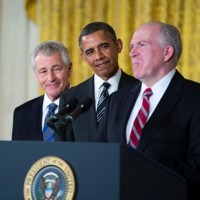U.S. leadership in the global security system is not what it used to be. Ukraine is in turmoil while Washington does little but warn and plead. Libya remains chaotic while the violent detritus of its 2011 civil war destabilizes Africa and the Levant. China uses ancient claims to assert ownership of tiny islands and potentially valuable stretches of the open sea. Gulf states are apoplectic over American inaction on the horrific Syrian civil war and the beginning of detente between Washington and Iran. America’s arch enemy al-Qaida seems as influential and dangerous as ever, with franchises popping up faster than branches of a popular fast food restaurant.
But even though everyone agrees that America’s influence and leadership are declining, diagnoses of the causes vary. The political right in the United States blames President Barack Obama’s lack of will, beginning with a failure to push the Iraqi government to keep U.S. troops around after 2011. As an exasperated Republican Sen. John McCain explained, “We are almost rudderless as far as our foreign policy is concerned.” If Obama just tried harder to impose America’s will on the world’s various crises, or if someone else were president, his critics on the right believe, U.S. leadership would be restored.
The Obama administration and most Democrats pin the blame on the militarization and unilateralism they inherited from the Bush administration. By portraying America’s conflict with al-Qaida as a war and deciding that success required the overthrow of regimes that supported or theoretically might support al-Qaida and other transnational terrorists, Bush elevated military power above political and economic influence while viewing partners as window dressing. This drained the United States of both money and allied good will. The Democrats believe it will take time to restore these assets. Secretary of Defense Chuck Hagel used a recent speech at the Munich Security Conference to stress that both he and Secretary of State John Kerry are working to “balance the relationship between American defense and diplomacy” and renew and enhance “partnerships with our friends and allies.”

